During his lifetime, Abd el-Kader, tribal leader and scholar of the Qur’an, became world-famous as both a freedom-fighter and an advocate for religious tolerance and cultural openness. President Abraham Lincoln thanked him for saving lives. French priests praised him from their pulpits. British readers admired him as they read his autobiography. And Algerians today regard him as a founder of modern Algeria and a symbol of its future. This May, the people of Elkader, Iowa (population less than 1400)—the only town in the United States named after an Arab—invoked his legacy when Algeria’s ambassador to the us helped school officials honor the teenage winner of the town’s high-school essay contest on the topic of religious understanding.
One might say that the beginning of this odd conjunction came on May 25, 1830, when the Ottoman governor of Algiers slapped the French consul with a flyswatter in an argument over unpaid bills. Soon after, the largest French navy since Napoleon’s campaign in Egypt was setting sail for Algeria to begin France’s ill-fated 130-year colonial occupation.
 |
| musee condÉ / giraudon / bridgeman art library |
| Above: Measuring more than a meter tall and four meters wide (51" x 173"), artist A. C. F. Decaen’s “Capture of the Tribe of Abd el-Kader” shows the French sacking of his tribes’ encampment in May 1843. Abd el-Kader escaped to Morocco. Below: An undated portrait of the amir, or prince, by Jean Baptiste Ange Tissier shows him with dignity and even reverence—note the prayer beads in his right hand—qualities that are common in French depictions of Abd el-Kader. |
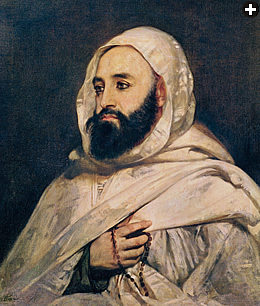 |
| chateau de versailles / giraudon / bridgeman art library |
Abd el-Kader was at the time a 22-year-old student on a sort of Grand Tour pilgrimage to Makkah, a two-year sojourn that included visits in Cairo, Damascus and Baghdad. He traveled in the company of his father, leader of the Hashim tribe, whose territory was centered in western Algeria near the town of Mascara. By the time Abd el-Kader returned home in 1832, the French army was marching into the Algerian interior, and, with his father’s blessing, Abd el-Kader took up leadership of what became a 15-year intertribal campaign for independence. His leadership united most of Algeria’s tribes into what became the beginning of the modern state. For this, his tribesmen called him amir al-mu‘minin—literally “Prince of the Faithful.”
Although Abd el-Kader’s military resistance failed, he won fame for his principled tenacity, and he went on to gain worldwide respect as an interlocutor between Islam and Christianity. He also befriended westerners who similarly worked to bridge gaps between East and West, including the Arabist Wilfrid Scawen Blunt and the builder of the Suez Canal, Ferdinand de Lesseps. Like them, Abd el-Kader believed that Christians and Muslims were not fated to remain always at odds, refighting the Crusades in the modern age. His spiritual writings and correspondence with Catholics sought common understanding with other monotheisms. As he wrote in 1849, “If Christians and Muslims had paid me any attention, I would have put an end to their quarrels. They would have become brothers, inside as well as out.”
Among his own people, he was just as successful in mediating tribal rivalries between Arabs and Berbers. (He claimed descent from the Berber Bani Ifran tribe as well as from the Prophet Muhammad.) In the Levant, he became a peacemaker among Muslims, Christians and Druze. During religious riots in 1860, he helped save some 12,000 Syrian Maronite Catholics, a heroic feat that prompted President Lincoln’s letter of thanks. By the time he died in Damascus in 1883, 53 years to the day after the French set sail for Algeria, even American farmers in Iowa admired his story enough to name a town for him.
Today, in a similar time of strife, the amir is not forgotten. Prince Hassan bin Talal of Jordan has written that Abd el-Kader’s concept of “true jihad,” an inner struggle to remain true to one’s religion, “provides Muslims with a much-needed antidote to the toxic false jihads of today, dominated by anger, violence and politics.”
The former archbishop of Algiers, Monseigneur Henri Teissier, stated that the example of Abd el-Kader’s good relations with French Catholic priests “gives us an alternative response—that even amid the most violent confrontations, one must always work for peace.”
Osama Abi-Mershed, who teaches North African history at Georgetown University in Washington, DC, notes that while older Algerians regard Abd el-Kader as the political founder of their nation, younger Algerians also see him as someone who sought out commonalities with Europeans rather than differences—thus a modern man like themselves.
During the years of resistance, from 1832 until his surrender in 1847, Abd el-Kader earned a reputation for treating his French hostages well, often feeding them better than he fed his own troops, and for releasing them if food became insufficient. His willingness to negotiate exchanges for his own men captured by the French became, for him, an opportunity to engage in dialogue with Catholic clergymen. (He negotiated with clergy because the French recognized only his religious role, not his political one.)
In 1841, the bishop of Algiers, Antoine-Adolphe Dupuch, wrote to Abd el-Kader asking him to free a French prisoner: “You do not know me, but my calling is to serve God and to love all men as His children and as my brothers.... I have neither money nor gold and can offer in return only the prayers of a sincere soul.” He ended with the Biblical quotation, “Blessed are the merciful, for they shall obtain mercy.”
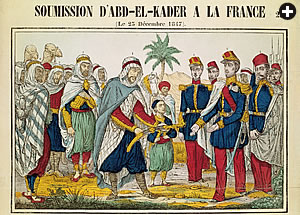 |
| musée de la ville de Paris / musée carnavalet / giraudon / bridgeman art library |
| “The Surrender of Abd el-Kader to France” is the title of this colored engraving, dated December 25,1847. After years as a fugitive in Morocco, Abd el-Kader surrendered on December 23 of that year. |
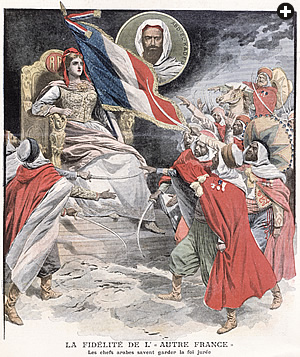 |
| archives charmet / bridgeman art library |
| “The Loyalty of ‘The Other France’: Arab chieftains know how to keep their oaths” is a 1907 color-lithograph cover of the French magazine Le Petit Journal. The importance of Abd el-Kader can be inferred from his appearance on the central background medallion. |
The amir responded with a stroke of spiritual one-upmanship by citing another Christian precept: “You should have asked me not for the freedom of only one, but of all the Christians who are imprisoned. Further, would you not have been twice as worthy of your mission had you asked not only for the liberation of two or three hundred Christians, but also offered to extend the same favor to an equal number of Muslims who languish in your prisons? It is written, ‘Do unto others as you would have them do unto you.’”
Thus an exchange was arranged. Dupuch’s vicar, Abbé Suchet, went behind enemy lines to carry out the exchange, and he provided the French one of their first eyewitness descriptions of the amir. “The redoubted chief was dressed as a simple sheikh,” he wrote, “in an ordinary haik, a white burnoose, and a cord of camelhair passed round his head. At the slightest mention of religion, his eyes fall, and then are raised gravely towards heaven in the manner of one inspired.” The two discussed the role of the Catholic clergy, and Abd el-Kader agreed that future French prisoners would have access to visiting priests.
But there was no time to put such moderation into action. The new governor-general of Algiers, General Thomas-Robert Bugeaud, notorious for his indiscriminate warfare against men, women and children alike, launched a ferocious campaign to crush Abd el-Kader’s resistance. By 1843 Abd el-Kader was forced to seek asylum in Morocco, and in 1847 he conceded defeat to the French.
Following Abd el-Kader’s surrender, the French broke their promise of exile in another Arab country and instead imprisoned him and his retinue for five years, during which he occasionally received close friends like Bishop Dupuch and Eugène Daumas, a former consul in Algeria, whose 1853 book Horses of the Sahara included the amir’s own chapter on Arab equestrianism.
In that chapter, Abd el-Kader indulged in a favorite topic, reciting such hoary Arabic proverbs as “Horses are birds without wings,” “For the horse, nothing is far away,” and “He who forgets the beauty of horses for women will not prosper.” It also appears that the amir’s legendary stamina in the saddle prompted him unwittingly to mislead his readers, as when he said that the distance a good horse could travel in a single day was one hundred miles, equal to the journey between Mascara and Tlemcen. That was a distance that he could ride in a day, but few others.
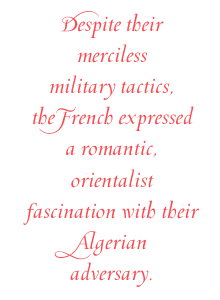 Despite their merciless military tactics, the French in these years expressed a romantic, orientalist fascination with their Algerian adversary. Painters Horace Vernet and Stanislas Chelowski captured Abd el-Kader’s likeness in war and at rest. Fictionalized accounts like The Prisoners of Abd el-Kader, or Five Months of Captivity among the Arabs, written in French by Ernest Alby and translated into English by the Arabist Lucie Duff Gordon, played on the usual clichés of beheadings, treachery and ravished women. The British novelist William Makepeace Thackeray’s 1848 poem “Abd el-Kader at Toulon, or the Caged Hawk” followed a nobler line, beginning, “No more, thou lithe and long-winged hawk, of desert life for thee / No more across the sultry sands shalt thou go swooping free.”
Despite their merciless military tactics, the French in these years expressed a romantic, orientalist fascination with their Algerian adversary. Painters Horace Vernet and Stanislas Chelowski captured Abd el-Kader’s likeness in war and at rest. Fictionalized accounts like The Prisoners of Abd el-Kader, or Five Months of Captivity among the Arabs, written in French by Ernest Alby and translated into English by the Arabist Lucie Duff Gordon, played on the usual clichés of beheadings, treachery and ravished women. The British novelist William Makepeace Thackeray’s 1848 poem “Abd el-Kader at Toulon, or the Caged Hawk” followed a nobler line, beginning, “No more, thou lithe and long-winged hawk, of desert life for thee / No more across the sultry sands shalt thou go swooping free.”
These were also the years that Abd el-Kader began deepening his study of Islam in particular and of spirituality in general. He wrote both Reminder for the Intelligent, Advice for the Indifferent, an investigation into the common beliefs of Christians and Muslims, as well as Kitab al Mawaqif, or The Book of Stopping Places, an esoteric study in the tradition of the 10th-century philosopher and mystic Ibn Arabi, whom Abd el-Kader further honored by preparing a new edition of Ibn Arabi’s The Illuminations of Makkah.
Following his release from prison in France in 1852, Abd el-Kader moved first to Bursa, Turkey, and then to Damascus, where he joined some 500 fellow Algerian exiles. There he made the acquaintance of such English women and men as Lady Jane Digby, who had married a Syrian shaykh, and British consul Richard Burton.
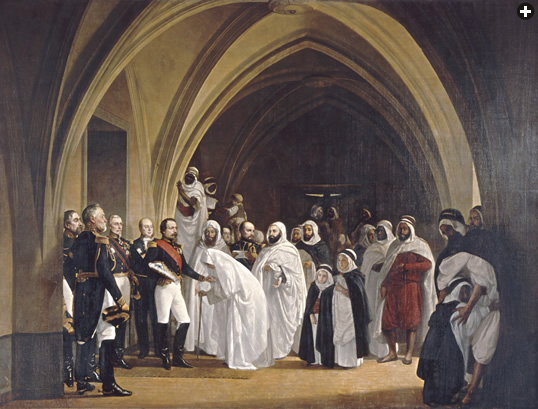 |
| franck raux / réunion des musées nationaux / art resource |
| After some five years’ imprisonment, during which time the amir wrote about the common beliefs of Muslims and Christians, Prince Louis Napoleon announced Abd el-Kader’s release on October 16, 1852. Present at the ceremony was Abd el-Kader’s mother, whom artist Jean Baptiste Ange Tissier showed kissing the French prince’s hand. |
His fame as a Muslim whose aegis extended to people of other beliefs was cemented by his actions in May 1860 in Syria, when Druze and Maronite Christian factions disagreed over enforcement of an Ottoman law, passed under western pressure, that set Muslims and non-Muslims on equal footing before military recruiters and tax collectors. Tensions escalated, and Druze began riots in Mount Lebanon, which the Ottoman rulers of Syria did nothing to stop.
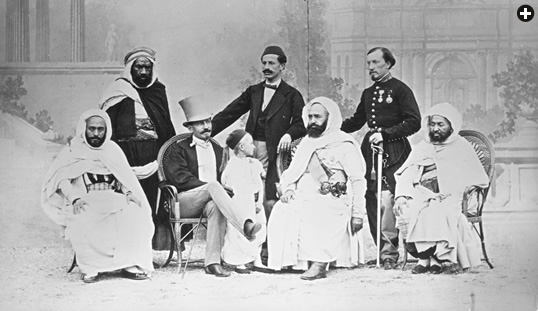 |
| snark / art resource |
| This 1867 photograph shows Abd el-Kader seated with General Patrice de Mac-Mahon, who became president of France in 1875. |
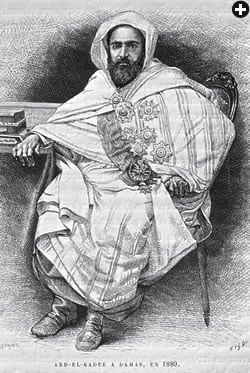 |
| gerard degeorge / bridgeman art library |
| This engraving of Abd el-Kader is dated 1880, three years before his death. |
As the violence spread, threatening the lives of Maronite Christians, Abd
el-Kader wrote a letter to Druze elders warning that “such proceedings are unworthy of your community,” but he
soon realized that only a show of force would be effective. When rioting reached Damascus on July 9, Abd el-Kader rebuffed the Ottoman governor’s request to disarm his men, and instead sent them into the city’s Christian quarters to escort residents to his own guarded precinct. When that overflowed, he pressed the governor to open the citadel to them, with safe passage guaranteed by his men. It is estimated that as many as 12,000 lives were thus saved.
As Mikhail Mishaqa, then serving as the us consul in Damascus, remembered in his memoirs, translated into English under the title Murder, Mayhem, Pillage and Plunder, “this outstanding man, whose excellence was well known to the kings and inhabitants of this earth, never rested a moment in his attempts to allay the revolt. There was not a single leader of the city, ulema, or agha, warning them against revolt, of its impermissibility in the Islamic religion, except for him.”
After the riots, Abd el-Kader wrote in response to a letter of thanks from the new bishop of Algiers, “What I did for the Christians, I did because of my faith as a Muslim.... All religions brought to us by the prophets, from Adam until Muhammad, rest on two principles—praise for God and compassion for all His creatures. Outside of this, there are only unimportant differences.”
In 1876, the amir met Charles Doughty, whose book Travels in Arabia Deserta tells of his getting a guarantee of safe passage from the pilgrimage route’s garrisons, which were manned by Abd el-Kader’s Algerian troops. Doughty praised Abd el-Kader as an “erudite among the erudite Moslems.” In Damascus he also met daily with Charles Henry Churchill, an older cousin of Winston, who acted as secretary for the dictation of what amounted to Abd el-Kader’s autobiography in English, published in 1867. The later biography of Abd el-Kader, Desert Hawk, was written in 1947 by Wilfrid Blunt, a distant relative of the Wilfrid Scawen Blunt who had been the amir’s frequent visitor in Syria.
The most recent biography is Commander of the Faithful: The Life and Times of Emir Abd el-Kader by John Kiser, published in 2008, and it is refocusing attention on Abd el-Kader’s role as an interfaith ambassador. As the amir himself stated in a letter to a French friend: “I have now become so tolerant that I respect all men, whatever their religion or beliefs. I dare even become the protector of dumb animals. God created men to be His servants, not the servants of other men.”
In this 150th anniversary year of the Damascus riots, the amir’s name is being praised again worldwide in venues that advocate peace and understanding. As the director-general of the United Nations Office in Geneva recently said, “His works reflect his belief that religion did not exclude science, that science did not exclude humanism, that faith did not exclude tolerance, that pragmatism did not exclude spiritualism.”
And so Abd el-Kader’s beliefs ring true from the halls of diplomacy to the American heartland. Stephannie Fox-Dixon, who as a 17-year-old senior at Central Community School in Elkader won the town’s first essay contest, found a personal connection to her town’s namesake.
“I perceive humanity with a view that everyone has the power to strengthen his or her character,” she wrote. “As a person grows, their character develops with them. Such humanity has the power to inspire other people. Abd el-Kader had a strong sense of character, and since learning about his life, I now regard Abd el-Kader as one of the forefathers of some of the world’s greatest nationalists and humanitarians, such as Gandhi and Martin Luther King, Jr.”
For those who champion the legacy of the amir, from Iowa to Algeria and around the world, this is high company to keep.
 |
Louis Werner (wernerworks@msn.com) is a writer and filmmaker living in New York. He is a frequent contributor to Saudi Aramco World and also writes for El Legado Andalusí and Américas, the magazine of the Organization of American States. He lives in New York. |